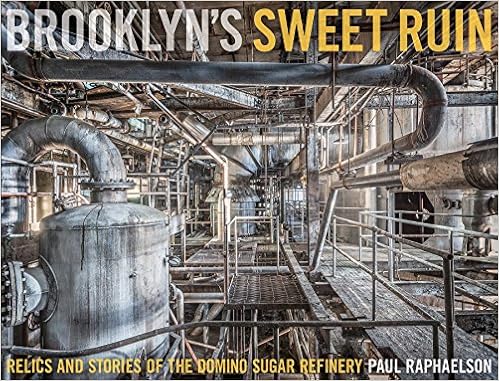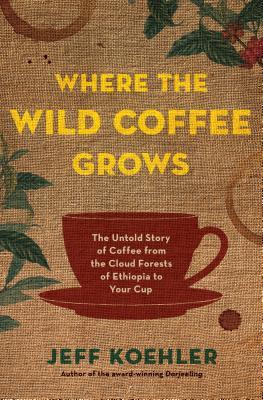The Refugees
by Viet Thanh Nguyen
Published: February 2017
8 short stories that span the wide spectrum of Vietnamese-American immigrant experiences. From literal ghost stories of those haunted by the past, to a neighborhood rivalry between two mothers struggling to make a difference, each story peers into a broken family displaced by war.
4 out of 5 stars: Beautifully moving stories of hope, sorrow, and nostalgia. For me, the standouts were "Black-Eyed Women", "War Years" and "I'd Love You To Want Me." I enjoyed these so much, I may have to revisit The Sympathizer (which still sits right where I left it when I got distracted by who knows what and failed our burgeoning book club so miserably. I'm better now, guys, promise!)
Tuesday, September 19, 2017
Friday, September 15, 2017
Brooklyn's Sweet Ruin
Brooklyn's Sweet Ruin: Relics and Stories of the Domino Sugar Refinery
by: Paul Raphaelson
To Be Published: Oct 2017
The Domino Sugar Refinery is an iconic figure of the Williamsburg skyline. At one point it was the world's largest sugar refinery, processing 4 million pounds of raw sugar a day. However production steadily decreased throughout later half of the 20th century and it eventually closed in 2004. Though it was granted historic landmark status in 2007, its fate has been in limbo since.
When I lived in Brooklyn I'd run by it daily, always wondering what was going on behind those shuttered doors. I mean, it stands on prime real estate in an area intent on gentrification, where posh waterfront studios just keep shooting up at an alarming rate. "Brooklyn's Sweet Ruin" gives a final glimpse into the heart of the Domino Sugar Refinery before its demolition. There is a certain sadness in seeing relics of an industrialized era, but in the nostalgia there is awe and wonder at what architecture and workforce are capable of.
by: Paul Raphaelson
To Be Published: Oct 2017
The Domino Sugar Refinery is an iconic figure of the Williamsburg skyline. At one point it was the world's largest sugar refinery, processing 4 million pounds of raw sugar a day. However production steadily decreased throughout later half of the 20th century and it eventually closed in 2004. Though it was granted historic landmark status in 2007, its fate has been in limbo since.
When I lived in Brooklyn I'd run by it daily, always wondering what was going on behind those shuttered doors. I mean, it stands on prime real estate in an area intent on gentrification, where posh waterfront studios just keep shooting up at an alarming rate. "Brooklyn's Sweet Ruin" gives a final glimpse into the heart of the Domino Sugar Refinery before its demolition. There is a certain sadness in seeing relics of an industrialized era, but in the nostalgia there is awe and wonder at what architecture and workforce are capable of.
4.5 out of 5 stars: The photos are absolutely gorgeous (with an undeniable "Fallout" vibe) but what I appreciated most was the accompanying write up: interviews with workers, a brief history of the refinery, and context for its place in history.
PS: Apparently this book started as project on Kickstarter, and you can find more information on this video posted by Paul Raphaelson and his website.
// I received this book free from NetGalley in exchange for an honest review.
 |
| From the Kickstarter page, view from the East River |
// I received this book free from NetGalley in exchange for an honest review.
Labels:
ARC,
book review,
brooklyn,
fallout,
netgalley,
nonfiction,
photography
Wednesday, September 13, 2017
Freshwater
Freshwater: a novel
by: Akwaeke Emezi
To be published: Feb 2018
Seamlessly weaving a Nigerian mythos of mischievous gods (Ọgbanje) with a Western understanding of psychopathology, this breakout novel burrows into the experience of trauma, self-awareness, and spiritual awakening. The deeply surreal story is narrated by a girl with "one foot on the other side" and the chorus of selves that reside in her fractured mind. Somehow despite the extremely heavy and personal subject matter, Emezi's narrative voices are as entertaining as they are painfully relatable.
5 out of 5 stars: What a fucking fantastic, unique read. I knew next to nothing going in and honestly want to cut this review short to extend the same courtesy to anyone else who may happen upon my page. That said, I read it on the tails of my vacation to the Yucatán peninsula, where I had the opportunity to learn more about the mysticism of the Mayans and their regard for their wind serpent god Kulkulkan. It's interesting how certain animals or representations resonate similarly with different ancient cultures. The Igbo and the Mayans may have been separated by a continent and ocean, but they both revered the power of the serpentine life force.
// I received this book free from NetGalley in exchange for an honest review.
PS: If you liked this you should also check out:
by: Akwaeke Emezi
To be published: Feb 2018
Seamlessly weaving a Nigerian mythos of mischievous gods (Ọgbanje) with a Western understanding of psychopathology, this breakout novel burrows into the experience of trauma, self-awareness, and spiritual awakening. The deeply surreal story is narrated by a girl with "one foot on the other side" and the chorus of selves that reside in her fractured mind. Somehow despite the extremely heavy and personal subject matter, Emezi's narrative voices are as entertaining as they are painfully relatable.
5 out of 5 stars: What a fucking fantastic, unique read. I knew next to nothing going in and honestly want to cut this review short to extend the same courtesy to anyone else who may happen upon my page. That said, I read it on the tails of my vacation to the Yucatán peninsula, where I had the opportunity to learn more about the mysticism of the Mayans and their regard for their wind serpent god Kulkulkan. It's interesting how certain animals or representations resonate similarly with different ancient cultures. The Igbo and the Mayans may have been separated by a continent and ocean, but they both revered the power of the serpentine life force.
// I received this book free from NetGalley in exchange for an honest review.
PS: If you liked this you should also check out:
Saturday, September 9, 2017
Where the Wild Coffee Grows
Where the Wild Coffee Grows: The Untold Story of Coffee from the Cloud Forests of Ethiopia to Your Cup
by: Jeff Koehler
To Be Published: Nov 2017
"Where the Wild Coffee Grows" takes us on a well-researched trek through the history of the coffee, bringing together the writings of explorers and historians as well as first hand accounts from living farmers, scientists, and magnates of the coffee industry. The journey begins in the forests of Ethiopia, where communities view the coffee preparation ritual as a social activity, an expression of their spiritual connection with nature. Then we follow the beans as they make their way into the Middle East and Europe through conquest and trade. We end in the modern era, riding the wave of mass-consumption and artisanal quality in a globalized market. Yet ominous clouds of issues billow ahead, threatening the natural existence of our favorite beverage: the steadily changing climate, the spread of fungal blights, and the unfortunate homogeneity of coffee-plant genetics leave the future uncertain.
4 out of 5 stars: As Colombian-American, coffee is quite literally my lifeblood. I felt like I owed it to my multi-cup-a-day habit to learn a bit more about this precious beverage, and I found the history of mankind's relationship with this bean to be fascinating. The first few chapters were a bit long-winded and overly detailed while excavating the history of Ethiopian politics, tangential to the story at hand. But once the text returned to the global impact of coffee and threats to its future, the book was hard to put down. The perspectives compiled for this work will appeal to coffee snobs and scientists alike, though honestly anyone with a taste for the black gold will enjoy reading up on its past, present and future.
// I received this book free from NetGalley in exchange for an honest review.
by: Jeff Koehler
To Be Published: Nov 2017
"Where the Wild Coffee Grows" takes us on a well-researched trek through the history of the coffee, bringing together the writings of explorers and historians as well as first hand accounts from living farmers, scientists, and magnates of the coffee industry. The journey begins in the forests of Ethiopia, where communities view the coffee preparation ritual as a social activity, an expression of their spiritual connection with nature. Then we follow the beans as they make their way into the Middle East and Europe through conquest and trade. We end in the modern era, riding the wave of mass-consumption and artisanal quality in a globalized market. Yet ominous clouds of issues billow ahead, threatening the natural existence of our favorite beverage: the steadily changing climate, the spread of fungal blights, and the unfortunate homogeneity of coffee-plant genetics leave the future uncertain.
4 out of 5 stars: As Colombian-American, coffee is quite literally my lifeblood. I felt like I owed it to my multi-cup-a-day habit to learn a bit more about this precious beverage, and I found the history of mankind's relationship with this bean to be fascinating. The first few chapters were a bit long-winded and overly detailed while excavating the history of Ethiopian politics, tangential to the story at hand. But once the text returned to the global impact of coffee and threats to its future, the book was hard to put down. The perspectives compiled for this work will appeal to coffee snobs and scientists alike, though honestly anyone with a taste for the black gold will enjoy reading up on its past, present and future.
// I received this book free from NetGalley in exchange for an honest review.
Labels:
ARC,
biology,
book review,
botany,
history,
netgalley,
nonfiction,
reading is fun
Subscribe to:
Comments (Atom)










